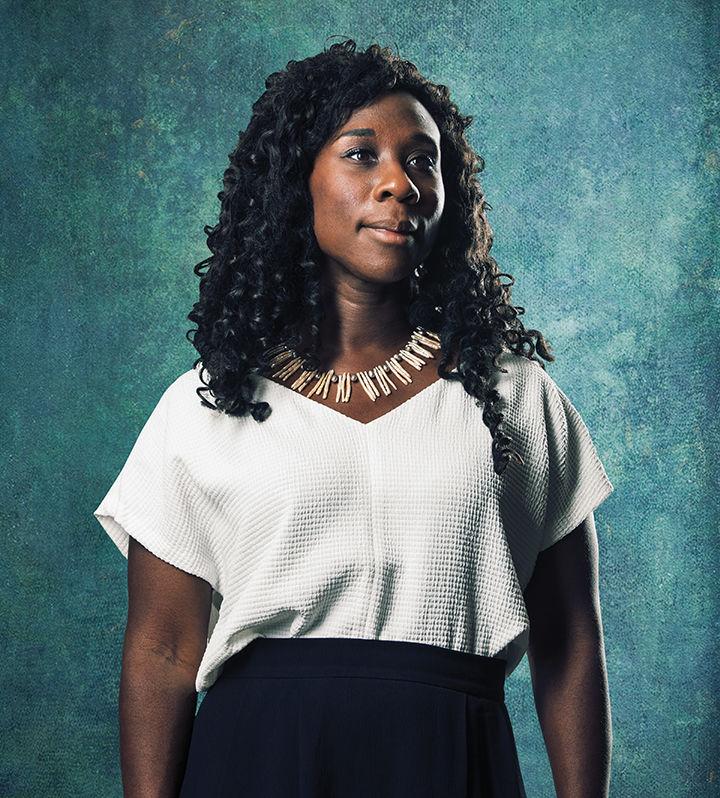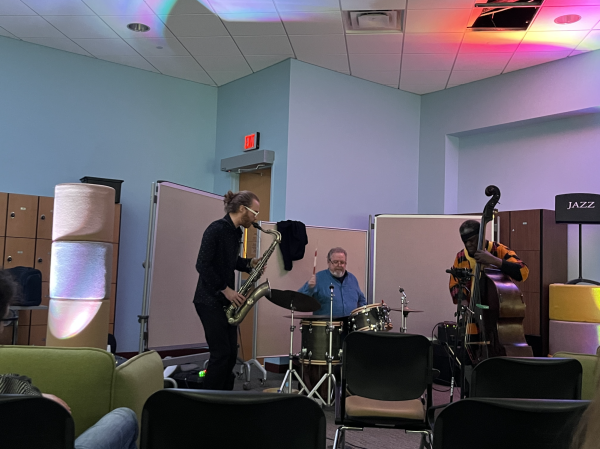Living Writers Concludes the Semester With Esi Edugyan
Canadian novelist Esi Edugyan visited Colgate on Thursday, December 5 as the final presenter of this year’s Living Writers series. Students and faculty gathered in Love Auditorium to listen to Edugyan discuss her novel Washington Black, winner of the Giller Prize and one of the New York Times Book Review’s 10 Best Books of 2018.
Inspired by a true story, the story
begins in 1830 and follows the life of Washington “Wash” Black, a young slave on a sugar plantation in Barbados.
Edugyan was introduced by Living Writers professor Jennifer Brice, who called Edugyan’s book “both a feat and a feast of storytelling.” Brice highlighted the recognition Edugyan has received for her previous three novels and Washington Black, shortlisted for the Booker prize and a finalist for the Andrew Carnegie Medal for Excellence in Fiction. She also gave a brief overview of the plot, which includes Wash’s dramatic escape from Barbados in a hot air balloon, and his travels to the Arctic and Morocco with the gentleman, scientist, naturalist, explorer and abolitionist Christopher “Titch” Wilde, the brother of his former master.
Edugyan began her talk by highlighting her desire to discuss the stories and histories that led her to write Washington Black.
“I’d like to speak about what gets lost in societies when we fail to acknowledge the honor, humanity and ingenuity of those who are unlike us,” Edugyan said.
Throughout the talk, Edugyan emphasized Washington Black as an exploration of slavery’s painful history with the character of Wash toeing the line of possibility in a world that sought to stifle him.
“What did it mean to him to be seen and acknowledged for the first time in his life, and how did that change his sense of what was possible in the world?” Edugyan asked. “What sort of wounds and ghosts would he carry from his past life into his new one?”
In discussing this theme of race and possibility, Edugyan highlighted the way in which she drew from her own life, telling the audience of her parents’ emigration to Canada from Ghana and the limitations they found in their new home.
“These questions, which are essentially
questions of displacement, self-definition, and belonging, really about one’s place and legitimacy in the world, are questions that have shaped and defined my own life,” Edugyan said.
Edugyan made a point to discuss the ways in which the often overlooked
history of Black Canadians influenced her writing, seen in the alienation Wash found from the Black community upon his visit to Nova Scotia. She talked about the importance of representation and how it ties into this theme of belonging and connection.
“It’s the feeling of being at odds with histories that you have every right to claim, or that somehow feel distant,” Edugyan said.
“What did it mean, after all, for me to walk down the long, wintry streets of Calgary and understand that no part of me had a hand in what loomed there?” she said.
During the question-and-answer session that followed the talk, one of the audience members asked Edugyan to expand upon her theme of travel. She talked about the slave narratives that she read while writing Washington Black, and how she tapped into a repeatedly expressed desire to travel to the ends of the earth to escape the horrors of slavery. She called her inclusion of travel to the wilds of the Arctic and North African desert a very deliberate narrative choice, both places setting the stage for an exploration of freedom, isolation, and self-determination.
Edugyan’s visit marked the end of the semester-long Living Writers series, with 10 award-winning authors of fiction, nonfiction and poetry having come to campus, including one Colgate alumnus as well as one Colgate faculty member.
Ellen Lawrence is a senior from Chicago, IL studying philosophy, political science and the Middle East. She previously served as the paper’s Senior Editor...











